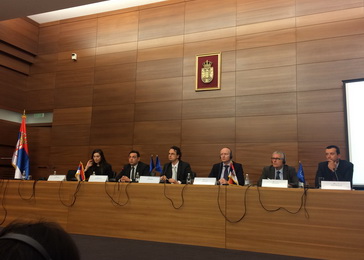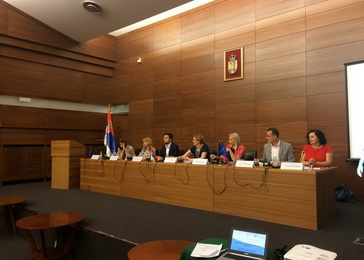 BELGRADE, 10 July 2014 – The Ministry of Labour, Employment, Veterans and Social Affairs and the Social Inclusion and Poverty Reduction Unit of the Government of the Republic of Serbia, in cooperation with the European Commission, organised a Workshop on Youth Employment Initiatives in Serbia.
BELGRADE, 10 July 2014 – The Ministry of Labour, Employment, Veterans and Social Affairs and the Social Inclusion and Poverty Reduction Unit of the Government of the Republic of Serbia, in cooperation with the European Commission, organised a Workshop on Youth Employment Initiatives in Serbia.
Mr Aleksandar Vulin, Minister of Labour, Employment, Veterans and Social Affairs, opened the workshop by stressing that youth unemployment, with the current youth unemployment rate exceeding 50%, represented a major problem both for the labour market and for the education system; in that regard, youth unemployment was a common problem and required to be addressed by both line ministries. Minister Vulin expressed his satisfaction with the fact that this issue was on the agenda.
Minister of Education, Science and Technological Development, Srđan Verbić, PhD highlighted the importance of youth education and training, as well as the need to offer internships, scholarships and opportunities for youth to gain practical knowledge in order to respond to labour market requirements, realise their own ideas through entrepreneurship and take the initiative to create opportunities for work and development for themselves and others. Having noted that nowadays youth lacked opportunities to develop their abilities, he added that the focus should, therefore, be on reforming the educational system, in order that it could provide the requisite practical knowledge and skills in demand in the labour market. Minister Verbić stated that the purpose of events such as this workshop was to discuss what changes were necessary.
 Head of the European Integration Section at the Delegation of the European Union to the Republic of Serbia, Mr Freek Janmaat stated that he was satisfied with the pace of Serbia’s progress in adopting EU standards and encouraged by the political will to address youth unemployment, which was a concern both for Europe and for Serbia.
Head of the European Integration Section at the Delegation of the European Union to the Republic of Serbia, Mr Freek Janmaat stated that he was satisfied with the pace of Serbia’s progress in adopting EU standards and encouraged by the political will to address youth unemployment, which was a concern both for Europe and for Serbia.
Further, Mr Janmaat highlighted that Serbia was required to adopt an Employment and Social Reform Programme (ESRP), viewed by the European Commission as an integral part of Serbia’s European integration, and noted that Serbia had made progress in that regard. The visit of Mr László Andor, EU Commissioner for Employment, Social Affairs and Inclusion, in September 2013, had marked the political launch of this process. The Programme was a part of a strategic process modelled after the Europe 2020 strategy, pursued by the European Union Member States. The document would follow the European integration process as the key mechanism for dialogue on the Republic of Serbia’s priorities in the areas of social policy and employment on its path to EU accession.
The challenge of youth employment was identified as a priority in the Draft Employment and Social Reform Programme, and the Workshop on Youth Employment Initiatives was part of the drafting process. Strategic options and measures that could be implemented in the context of the Republic of Serbia were discussed at the event.
 Experiences in reducing youth unemployment, operational details of instruments and initiatives in the European Union were presented at the workshop by experts from Austria, Croatia, Slovenia and the Czech Republic, as well as Mr Thomas Bender, Head of Unit at the Directorate-General for Employment, Social Affairs and Inclusion, European Commission. Mr Bender presented a new EU instrument – the Youth Employment Package, as well as ways to reduce youth unemployment, since this problem was still growing in a vast majority of countries. The key problems faced by EU Member States were: youth dropping out of education, low-skilled youth, limited youth employment opportunities, as well as a high risk of social exclusion of youth not in employment, education or training (NEET). The Croatian experience pointed to significant funding under the European Social Fund and the Youth Employment Initiative, which could be used for channelling the state response to youth unemployment. Particular emphasis was placed on cross-sectoral cooperation, considering that a Youth Guarantee Council had been established in Croatia as a governmental body gathering 17 ministries and partners. The experience of Austria, the country with the lowest youth unemployment rate in Europe, conveyed the message that enhanced implementation of active youth employment policies was required, as well as higher budget allocations, good labour market conditions, apprenticeship and internship system, vocational education and training, and a broad political consensus on fighting youth unemployment. In addition, the Austrian representative highlighted that political consensus was crucial to solving this problem.
Experiences in reducing youth unemployment, operational details of instruments and initiatives in the European Union were presented at the workshop by experts from Austria, Croatia, Slovenia and the Czech Republic, as well as Mr Thomas Bender, Head of Unit at the Directorate-General for Employment, Social Affairs and Inclusion, European Commission. Mr Bender presented a new EU instrument – the Youth Employment Package, as well as ways to reduce youth unemployment, since this problem was still growing in a vast majority of countries. The key problems faced by EU Member States were: youth dropping out of education, low-skilled youth, limited youth employment opportunities, as well as a high risk of social exclusion of youth not in employment, education or training (NEET). The Croatian experience pointed to significant funding under the European Social Fund and the Youth Employment Initiative, which could be used for channelling the state response to youth unemployment. Particular emphasis was placed on cross-sectoral cooperation, considering that a Youth Guarantee Council had been established in Croatia as a governmental body gathering 17 ministries and partners. The experience of Austria, the country with the lowest youth unemployment rate in Europe, conveyed the message that enhanced implementation of active youth employment policies was required, as well as higher budget allocations, good labour market conditions, apprenticeship and internship system, vocational education and training, and a broad political consensus on fighting youth unemployment. In addition, the Austrian representative highlighted that political consensus was crucial to solving this problem.
The Serbian Ministry of Education, Science and Technological Development was aware that great challenges lay ahead of us with respect to matching education and skills development to labour market needs, as well as adapting the curricula with a view to promoting entrepreneurial education.
The Czech experience indicated that the key to solving the youth unemployment problem was linking vocational education and training and active employment policies, and promoting the development of entrepreneurial learning. Slovenia was particularly focused on promoting start-ups and providing assistance and support to entrepreneurs.
In his address, Manager of the Social Inclusion and Poverty Reduction Unit of the Government of the Republic of Serbia, Mr Žarko Šunderić presented the measures implemented by the Government in collaboration with the European Union, clarified the role of the Unit, whose responsibility was strengthening the governmental institutions’ capacities to develop and implement social inclusion policies based on European good practices, and invited colleagues from the region to further develop good cooperation and exchange of experiences. Mr Šunderić highlighted that this was only an initial step in addressing this issue and that plenty of work awaited us in the forthcoming period.
The Workshop on Youth Employment Initiatives was attended by about 140 participants, representatives of the line ministries, professionals, the civil sector and youth themselves.
The speakers’ presentations are available for download at the following links:
- Thomas Bender, Head of Unit, Directorate-General for Employment, Social Affairs and Inclusion, European Commission
- Irena Bačelić, Head of the Sector for Labour Market Analysis, Ministry of Labour and Pension System, Republic of Croatia
- Johannes Schweighofer, Head of the International Labour Market Policy and Research Unit, Ministry of Social Affairs, Austria
- Dagmar Vránová, senior expert, Ministry of Industry and Trade, Czech Republic
- Urban Lapajne, Organisational Board, Initiative Start:up! Slovenia
- Mirjana Šakić, Erste Banka
 Government of the Republic of Serbia
Government of the Republic of Serbia














 pdf [271 KB]
pdf [271 KB]
Leave a Comment